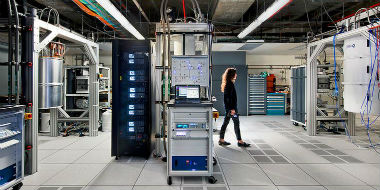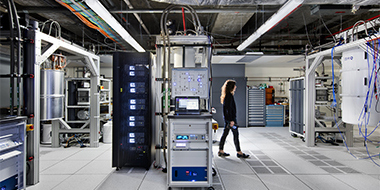Cognitive Computing
Innovation Today for Solving the Challenges of Tomorrow
July 29, 2016 | Written by: mrzimmerman
Categorized: Cognitive Computing | Quantum Computing
Share this post:
Change is the only constant in the technology industry, especially in the fields of science and research.
The exponential growth of data from sources like enterprises, social media, sensors and devices is propelling change faster than ever before. At the same time, we are witnessing something we never thought we’d have to face – the deterioration of the once immutable Moore’s Law. These forces at play have forced organizations of every size to rethink their approach to innovation.
The United States government is no different. Today, we’re in Washington DC to commemorate the one year anniversary of the establishment of the National Strategic Computing Initiative (NSCI) – a US initiative to maximize the benefits of high-performance computing (HPC) research, development, and deployment.
Supercomputing or HPC has always been about pushing the limits of computers for the workloads of the next generation. Along the way we’ve established a foundation that has enabled science and research to reach optimal performance levels. But this foundation is just that, a baseline of computing performance to set the table for new and revolutionary methods of gaining insight into some of the toughest problems on the planet.
As we continue to move the supercomputing needle forward, we’re seeing the need for completely different computing models and an opportunity for revolutionary capabilities and technologies. As we enter the era of cognitive computing, organizations are becoming smarter as well as more productive by leveraging their IT infrastructure.
When systems are able to mine, ingest, curate, manage and provide predictive analysis of seemingly unending supplies of data, scientists and researchers are better prepared to act on that data and bring valuable insight to the forefront.
Innovation like this is critical for the US technology agenda and for the success of the NSCI. IBM, with its deep, rich history of systems innovation, continues to deliver cutting edge technologies for organizations to leverage in their research and businesses. Our unique capabilities with cognitive data-centric computing and acceleration is bringing compute to the data and dramatically changing the way the industry has done computing in the past.
Our work with the US Department of Energy’s CORAL program to deliver two state of the art supercomputers will leverage key new technologies and partnerships to provide world-class computing for the US Department of Energy.
In addition, IBM is developing new brain-inspired processors, like our TrueNorth chip along with associated ecosystems which is designed to bring more capabilities to cognitive computing and allow systems to efficiently process real-time data at incredibly low power consumption.
IBM is working on developing Quantum Computing technologies and also recently introduced the IBM Quantum Experience, the world’s first quantum computing platform delivered via the IBM Cloud, allowing users to run algorithms and experiments, work with quantum bits (qubits), and explore tutorials and simulations around what might be possible with quantum computing.
However, all the work that will benefit initiatives like the NSCI requires much different approaches to innovation than the industry has implemented in the past. To continue delivering truly ground breaking technology, we must work together.
Open approaches to innovation – like that of the OpenPOWER Foundation – brings together the finest and brightest technologists from around the globe and enables rapid design and development to solve the grand challenges of the country and the world that are not as easily solved with closed and proprietary approaches.
No one company can own the innovation agenda, it takes a community collaboratively working towards the goals of the future to bring HPC to the next level.
As we commemorate one year of the NSCI it is exciting to see what organizations around the country are doing to help the program reach its goals. We look forward to our continued work with our current and future OpenPOWER partners and with the NSCI to dramatically advance computing now and in the future.

Global Program Manager, Cloud Communications; Managing Editor, IBM THINK Blog
First IBM “Q Hub” in Asia to Spur the Quantum Ecosystem
IBM built the first vacuum tube “supercomputer” in 1944, the Mark I. The first digital mainframe, the IBM 1401, came along 15 years later in 1959. The IBM 360 mainframe made history when it was released in 1964 but it would be another 17 years before the PC arrived – a computer that people could […]
CEVA Links Cognitive Supply Chain to Holiday Season Rewards
CEVA is a multi-billion dollar global supply chain management company that works with some of the busiest retailers in the business. We’re responsible for everything from contract logistics to freight management, packing and shipping, and all on a global scale. Our business is much more than simply moving things from A to B. We operate […]
Getting the World Quantum Ready
The world took a big leap forward toward quantum computing readiness, today. A dozen international organizations representing Fortune 500 companies, academia, and the government joined the newly minted IBM Q Network. Together, we are committed to exploring scientific and commercial applications of quantum computing, leveraging IBM’s recently-announced 20-qubit commercial system – and, soon, our next-generation […]


